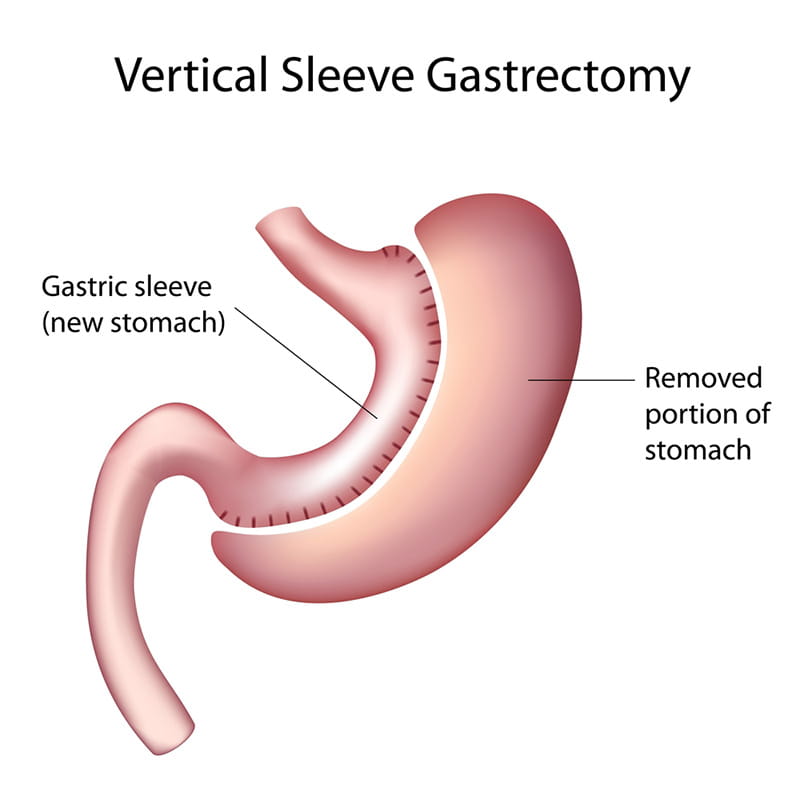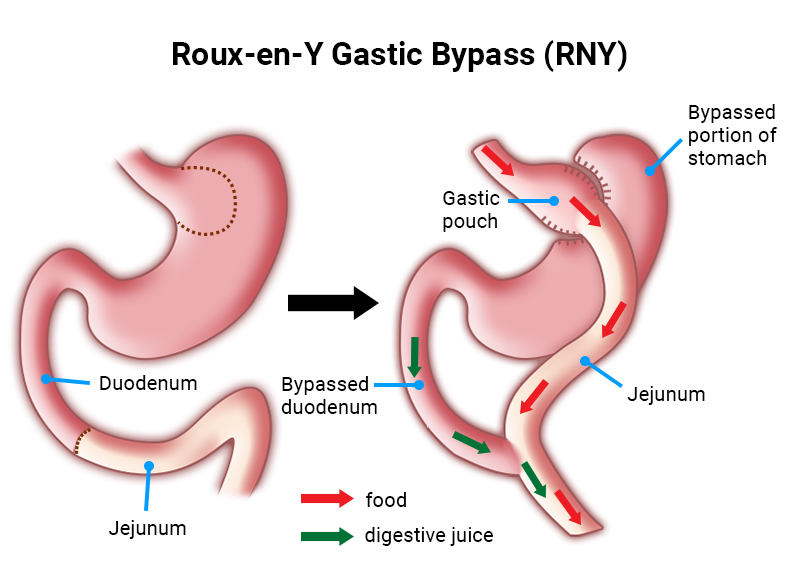Bariatric Surgery (Weight Loss Surgery)

Obesity, an emerging health epidemic around the world, affects approximately 10% of the Australian adult population. It is a risk factor leading to serious medical conditions such as the heart disease, stroke, high blood pressure, diabetes, gallbladder disease, osteoarthritis, sleep apnoea, asthma, some cancers, and gout.
Obesity is caused by several factors such as genetics, overeating, lack of physical exercises, misbalances in metabolism (conversion of the food into body’s energy), and psychological factors such as stress and anxiety.
Body Mass Index (BMI) calculated by dividing your weight in kilograms by your height in metres squared serves as an indicator of healthy weight. For adults, over 20 years a BMI between 18.5 and 25 is considered healthy. If a BMI is between 25 and 30, the person is considered overweight, while people with BMIs over 30 are considered obese. Persons with a body mass index (BMI) of more than 40 are defined as morbidly obese who have a reduced life expectancy of 5–20 years.
While the lifestyle measures such as healthy eating and exercises are the best way to address the obesity problem and restore a healthy weight, for those with the BMI index over 35, it may not be enough. Providing all other treatments have failed, bariatric surgery is the most effective treatment of morbid obesity. Outcomes of the surgical procedure include a sustainable loss of body weight, reduction and sometimes resolution of medical comorbidities, and improved quality of life.
IFSO and ASMBS have produced the New Guidelines on Indications for BMS,**
that replace the Old Guidelines of NIH from 1991.**
The New Guidelines were published on Oct. 21st 2022 on Obesity Surgery and SOARD. They have been added to the ANZMOSS website https://anzmoss.com.au/ifso-guidelines/
Weight Loss (Bariatric) Surgical Fees Package
As a Bariatric and Weight-Loss surgery practice, one of the most common questions we receive is how much will the Sleeve Gastrectomy or Bypass cost?
While we cannot give a definitive answer until you have been seen by Dr Mastakov, a key difference in the way Dr Mastakov runs his clinic is to refund as much of the rebates to his patients. This reduces patients’ out-of-pocket expenses.
Please note that the total cost of having surgery in a private hospital is a combination of fees from multiple providers. Our fee is known as the surgical fees. This is the only fee which we set. There will also be fees for your anaesthetist, the surgical assistant, the hospital, and, if required, any specific equipment required during surgery, pathology/radiology tests, and some medications.
Each operation is specific to the patient. All quotations are based on the appropriate Medicare Item Numbers which can be determined by Dr Mastakov during the consultation. Should you be booked for surgery, the detailed Informed Financial Consent (IFC) will be provided to you via email.
Please note that our Surgical Fees Package includes:
What is a Hiatus Hernia and why is it included?
The Hiatus hernia is when part of the stomach moves into the chest through the diaphragm (a thin dome-shaped muscular sheet that separates the chest from the abdomen). A hiatus hernia by itself can be without symptoms or pre-existing. We have learned from our experience over the past few years that the hiatal hernia best be repaired during gastric sleeve (or gastric bypass) surgery to restore normal anatomy and to prevent post-operative acid reflux, bile gastritis and other complications. If hiatus hernia is found but not repaired on a day, you may require another surgery.
If Hiatus Hernia repair is needed, the impact and ease to complete this procedure at the time of the Sleeve Gastrectomy (or Gastric Bypass) ultimately saves the patient time, money, and the emotional impact of multiple surgeries.
Be mindful that not all practices include such additional procedures as Gastroscopy and Hiatus Hernia repair as part of their quote.
Gastric Bypass Costs
In our Practice, the out-of-pocket expenses for a Gastric Bypass are the same as a Sleeve Gastrectomy for private patients, which allows the procedure to be done according to the medical needs of the patient, and not on a cost basis.
A Gastric Bypass, same as Sleeve Gastrectomy, is also supported by access to Super through the Early early release of Super funds on compassionate grounds, and for the uninsured, the cost difference is reasonable and affordable.
Due to the reasonable costs of both the Gastric Bypass and the Sleeve Gastrectomy, we can ensure that our patient’s needs are being met, giving them the best outcome possible.
Weight Loss Surgery without Private Health Cover
If you don’t have Private Health Cover, we would encourage you to consider investing in private health cover and wait the 12-month qualifying period.
If you would like to undergo Sleeve Gastrectomy or Gastric Bypass surgery in the near future, we would be happy to request a quote from the hospital, the anaesthetist and the assistant on your behalf. Where applicable, we will provide documentation to support your claim to the Australian Taxation Office (ATO) for accessing your superannuation earlier on ‘compassionate grounds’ (please refer to more details below). If your application is approved by ATO, you will be able to use your super for funding surgery costs.
Contact Us Today
If you’d like to discuss your options for weight loss surgery in Brisbane or Hervey Bay, our team would love to welcome you to our clinics. In your initial appointment, we will listen to your goals and suggest the best option to meet your weight loss goals.
For a personalised quote and consultation please call 07 3414 3950 or 07 4148 7082 to book your appointment to see Dr Mastakov. All you need is a letter of referral from your general practitioner (GP). Your consultation is an excellent way to find out more about Weight Loss Surgery. If you decide after the consultation you don’t want to proceed further, there is no pressure to do so at all.
How long do I have to wait for an appointment with Dr Mastakov?
How soon can I have my surgery?
We carefully manage our wait list; we therefore have availability and can see clients normally within 1-2 weeks from a referral, in person or via TeleHealth.
Patients are booked for weight loss surgery as soon as they are ready, subject to theatre availability. Being ready for surgery means you are prepared to be admitted to hospital and have had any tests or procedures needed before your surgery (Dr Mastakov will advise you at your initial consultation). Patients spend an average of two to three days in the hospital following laparoscopic Sleeve Gastrectomy. You need to take at least 2 weeks off work allow your body to recover and heal.
To facilitate weight loss prior to Weight Loss Surgery, Dr Mastakov recommends to his patients to follow the FORMULITE Meal Plan for 2 weeks before surgery and drink plenty of water.
Rapid Weight Loss / Pre-Surgery pack which includes 3 Meal Replacement Shake Tubs, 2 Week Meal Plans and Recipe E-book and a Formulite Blender Bottle can be purchased online from https://formulite.com.au/shop/pre-surgery-pack/#select-1st-shake-flavour
You can also use low sugar low carbs “IsoWhey weight management” or “FatBlaster Keto-Fit” Proteins which are available from any Chemist.
We DO NOT recommend to use an OPTIFAST range because it’s high in carbs & sugar.
To assist patients with weight loss our practice offers Laparoscopic Sleeve Gastrectomy surgery (Gastric Sleeve) at Sunnybank Private Hospital (Brisbane) and at St Stephen’s Private Hospital (Hervey Bay, QLD).
Dr Mastakov also performs Roux-en-Y Gastric Bypass (RYGB) at Sunnybank Private Hospital (Brisbane).
We are pleased to provide this life-changing opportunity to patients who are covered for Bariatric Surgery with their Private Health Insurance and those who are Uninsured.
We believe that your follow up appointments after your Bariatric Surgery are one of the most important factors that will help you to achieve long term success. With this in mind, we offer Bulk Billed appointments for the first 12 months following your surgery.
All uninsured patients are encouraged to consider investing in private health cover and wait the 12 month qualifying period. Where applicable, we will provide documentation to support your claim to the Australian Taxation Office (ATO) for accessing your superannuation early on “compassionate grounds” to finance treatment expenses.
Sleeve Gastrectomy
Sleeve Gastrectomy (SG) is a laparoscopic or keyhole surgical procedure, which actually doesn’t include any surgery on the intestines. It is one of the most effective bariatric procedures. By changing the stomach shape from sac to a long narrow gastric tube, SG dramatically reduces the capacity of the stomach from approximately 2L to 100-150 ml.
In addition, the recent studies have shown, the part of the stomach that is removed during sleeve gastrectomy plays a major part in producing the hunger hormone (Grehlin). This further aids in the reduction of appetite and food craving.
The smaller stomach capacity restricts food intake by allowing only a small amount of food to be eaten at any meal. As a result, the patients feel early fullness and satiety while eating just 3 small meals per day. This facilitates weight loss. In addition, regular exercise and healthy food choices are also necessary to optimize the outcome.
Sleeve gastrectomy is becoming increasingly popular and has progressively been performed as a standalone procedure. With satisfactory results in the mid-term the extent of excess weight loss is about 60% (final results may vary on the individual). Risks of the surgical complications such as bleeding and leakage from the cut edge of the remaining stomach are low within 1-3%.
Sleeve gastrectomy (SG), and Roux-en-Y gastric bypass (RYGB) are the most common and effective bariatric surgical procedures available, and the most popular in Australia.

Further Reading
Better Health Channel
Laparoscopic Sleeve Gastrectomy
The International Federation for the Surgery of Obesity and Metabolic Disorders (IFSO)
Sleeve Gastrectomy
The Science of Obesity
thescienceofobesity.com.au

Roux-en-Y Gastric Bypass
A gastric bypass (Roux-end-Y gastric bypass) is a common and popular bariatric procedure in Australia as well as overseas and has been considered the gold standard of bariatric surgery. The procedure has been extensively studied over the last 50 years and can be performed using a laparoscopic (keyhole) approach. A standard gastric bypass is performed under general anaesthesia in less than 2 – 3 hours and typically involves a hospital stay of one to two days.
The operation involves the creation of a small stomach pouch and diversion of food away from most of the stomach and a small portion of the small intestine. The surgery allows for digestive fluids to still meet with ingested food and enable nutrient digestion and absorption. A significant advantage of the procedure is that no portion of the stomach is removed and essentially the procedure can be reversed if necessary.
The gastric bypass procedure helps obese people to lose weight by:
The gastric bypass procedure produces excellent outcomes in long term studies and results in an increased longevity and quality of life. On average a patient is expected to lose around one third of their total body weight after undergoing the gastric bypass procedure in the first two years. Most patients will maintain a weight loss of around 25% beyond 10 years. Additionally, there is significant reduction/improvement in obesity related diseases including:
The risk of postoperative complications associated with the gastric bypass procedure is low with a less than 0.2% risk of dying from the surgery. The risk of severe complications such as bleeding, infection and thromboembolism is less than 5%.
Gastric bypass surgery is currently as safe as gallbladder surgery.
However, the procedure results in permanent alteration in the absorption of vitamins and minerals and as a result can cause such important clinical conditions as anaemia, osteoporosis, and malnutrition. The following are the most common micronutrient deficiencies:
Therefore, all patients undergoing a gastric bypass require ongoing life-long surveillance and supplementation of vitamins and minerals.
According to The International Federation for the Surgery of Obesity and Metabolic Disorders (IFSO) the following lists summarise the pros and cons of the gastric bypass procedure.
Pros
Cons
Further Reading
The American Society for Metabolic and Bariatric Surgery (ASMBS)
Roux-en-Y Gastric Bypass (RYGB)
The International Federation for the Surgery of Obesity and Metabolic Disorders (IFSO)
Roux-en-Y Gastric Bypass
The Science of Obesity
thescienceofobesity.com.au

